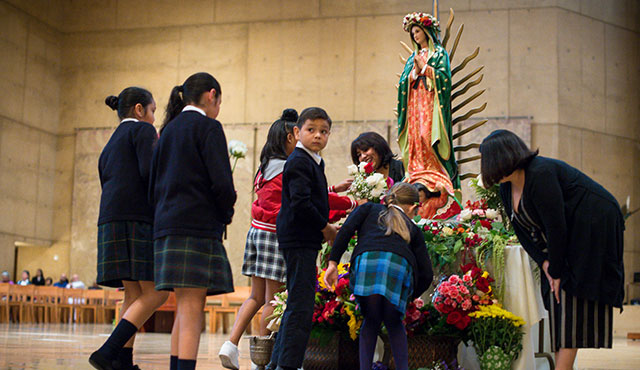When young adults leave their family for college, work, marriage or the military, it’s hard for parents to let go. It’s sometimes even tougher to realize that they make their own decisions about life – including if and how to worship God.
How can parents ensure that their growing children instill the values of home, family, and faith? How, just as importantly, can we be sure they will remain Catholics?
Parents have an intense drive to make sure their children accept their values and act according to those standards, says The Center for Parenting Education in an online article, “Values Matter.” Still, the article warns, strong adherence to one’s values is a common cause of tension between parents and children, especially teens, when the children espouse opposing values.
The article urges parents to know their goals for their children and decide how to relate to them. That focuses parenting choices on the key messages they want to send and determines the behaviors and attitudes they want to reinforce.
- Do you want your growing child to have a strong work ethic?
- Is it important that you child grows up to be a kind person?
- Do you value generosity and want your kids to give freely of themselves and their possessions?
- Is it vital that your son or daughter be assertive?
- Do you want them to have a keen sense of independence?
If parents think hard about their own values, the Center says, it’s easier for them to help children become honest, polite, neat, creative, or to ensure that they socialize easily and value time with their families and friends.
The Catholic Answer claims that because adult children and teens today often grow up in families overwhelmed with stress, disappointment, trauma, and doubt, it can be difficult to influence them to live values-centered lives.
“They are assaulted by divorce, unemployment and displacement, coupled with a pervasive identity crisis and seemingly fruitless search for meaning,” writer Christine Valenine-Owsik continues. “Other issues include substance abuse, accelerating inclinations toward the occult and a variety of sexual addictions. Whether a symptom or a result of their unfulfilling lives, directionless young adults often subscribe to the trendy new faith: none.”
It’s natural that teens break away from their parents and closely identify with their peer group, the “Values Matter” story notes. Once teens mature, they break away from their friends and develop their own values. And when they become parents themselves, values can change and become higher priorities in their lives. Many times, this includes a return to the Church – or at least to institutional worship of God.
The most important thing Catholic parents can do to ensure their children grow to treasure similar values, Valentine-Owsik says, is to teach them personally, from day one, about Catholicism.
“Giving kids the unblemished truth about Catholicism, at each stage of development, shapes their early understanding of God, affection for Him and conscience, and helps them develop a spiritual ‘eye,’” writes Valenine-Owsik. “Parents — beyond Catholic schools, CCD programs, books, apps, Church youth organizations, etc. — have the primary responsibility before God to ground their children in the faith.”
Kids should understand why Catholicism is the true faith instituted by Christ, she adds. “Only Catholicism has the true presence of Christ in the holy Eucharist, and six additional sacraments given by Christ for salvation.
“It’s the only one with papal authority for teaching clarity, long-standing apostolic tradition and unchangeable doctrine.”

